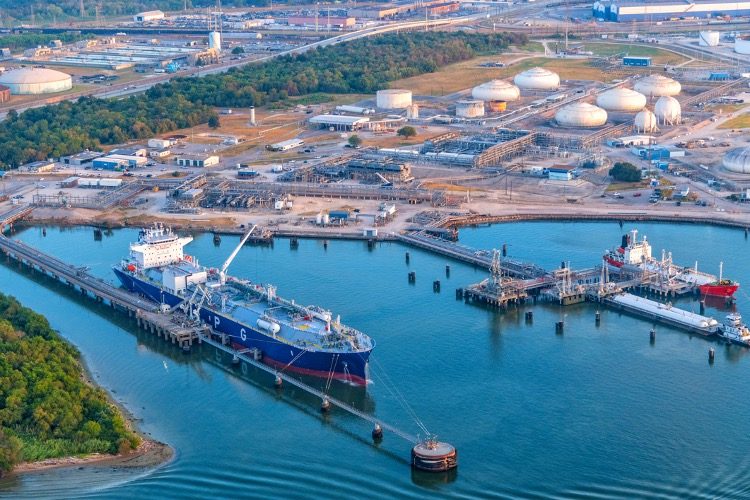
The temporary halt of approvals for new liquefied natural gas (LNG) export terminals by the Biden administration will imperil trust in the industry, Shell CEO Wael Sawan told the Financial Times (FT) in an interview on Sunday.
“I don’t think the recent announcement by the administration necessarily impacts, in the short or medium term, the supply of LNG, but I do think it erodes confidence in the longer term,” Sawan said.
The response comes as the British energy multinational, the world’s second-biggest LNG shipper after Qatar Energy, has found itself entangled in a legal dispute with U.S. exporter Venture Global LNG. In September, Shell and BP launched separate arbitration proceedings against Venture Global for allegedly refusing to honor a multibillion-dollar supply contract.
Sawan elaborated that Biden’s decision, compounded by Venture Global moving toward “not honouring the contracts with their foundation buyers,” starts to raise more doubts about “the stability and security of LNG from the US.”
Kathy Mikells, chief financial officer of ExxonMobil, slammed the White House’s decision as well, saying that such bans jeopardize efforts to reduce energy-consuming nations’ reliance on coal.
“It means less US produced natural gas is available to replace coal around the world — that’s clearly a bad thing,” she stated in an interview with FT.
Chevron CFO Pierre Breber added that energy policy should not be a question of politics. “The world needs affordable, reliable, ever-cleaner energy,” he told the outlet. “US LNG exports are good for this country: it creates jobs, it helps the balance of trade. It’s good for our allies who are looking for sources of energy…. And it’s good for the environment, because … in many instances the LNG is [replacing] coal.”
Biden demanded a pause on approvals for LNG exports from new projects in the country on January 26, citing their potential contribution to climate change. Nonetheless, many large producers have vocally opposed the move, emphasizing that LNG plays a vital role in the energy transition. The super-chilled fuel produces half the carbon dioxide of coal for the same amount of energy, and 30 percent less than oil.
The controversial decision has also sparked the ire of Republicans on the House Committee on Energy and Commerce. The lawmakers said the halt inevitably weakens global energy security and imperils U.S. efforts to help the EU reduce its dependence on Russian energy.
Since the start of the Russia-Ukraine conflict, the EU has become increasingly dependent on LNG shipments from the United States as it tries to replace pipeline gas from Russia. Committee Chair Cathy McMorris Rodgers (Wash.) called Biden’s decision “another gift to Putin.”
However, industry experts surveyed by Foreign Policy magazine believe that in the short term, the suspension of LNG exports will not have a key impact on the market or on EU energy security.
Citing industry experts, Bloomberg reported in January that replacing Russian gas with liquefied natural gas from the United States has exposed the EU’s energy system to major security risks.
The United States, which began exporting shale gas only in 2016, is presently the second-largest gas supplier to the EU after Norway. In 2023, the United States became the world’s top LNG exporter.
Many EU states drastically increased LNG purchases in 2023 after the reduction in pipeline gas flows from Russia owing to Ukraine-related sanctions and the sabotage of the Nord Stream pipelines in September 2022, which made them inoperable.
“European reliance on US LNG will only grow, if more Russian gas does not reappear and the Qataris decide not to engage in a price war for market share,” Ira Joseph, a senior research associate at the Center on Global Energy Policy at Columbia University, told the news agency. Nevertheless, the analyst warned that changes in U.S. policy could pose a major risk.
The White House had made a pledge to Brussels to quickly review applications for new export capabilities after the bloc decided to reduce its energy reliance on Russia.
Biden’s announcement “does not keep faith with that pledge,” per Fred Hutchison, president and CEO of LNG Allies, cited by Bloomberg.
Energy Aspects gas analyst David Seduski believes that the halt will “almost certainly be undone” if Republicans retake the White House.
“This could be a pause for political purposes, to appease Biden’s base in the run-up to the general election,” he said. “Or it could be a longer halt to permitting that clamps down on the chances of these terminals being approved longer term.”
An unnamed senior EU official told the agency that the European Commission is not worried about the bloc’s growing dependency on U.S. liquefied natural gas as it does not carry the same level of political risks as dependence on Russian gas.
However, analysts highlight potential challenges ahead. Jonty Shepard, vice president of global LNG trading and origination at BP, had previously warned that the rising reliance on U.S. gas is creating a “concentration risk” for the entire sector.
On January 3, Reuters reported that the United States emerged as the globe’s largest exporter of liquefied natural gas for the global market in 2023, citing tanker tracking and government data. Australia came in second, while Qatar, which ranked first in 2022, saw its output drop by 1.9 percent and slid to third place.
Based on the report, U.S. LNG exports hit monthly and annual records last month, with the country exporting 8.6 million metric tons in December alone, to total 88.9 million metric tons in 2023, up 14.7 percent compared to 2022.
As per U.S. government data, Europe remained the foremost destination for the American exports last month, accounting for 5.43 million metric tons, or more than 60 percent of overall shipments, and nearly 70 percent of the exports were destined for the region in November.
Meanwhile, per earlier reports, despite Brussels’ drive to rid itself of Russian energy, the EU has been increasing imports of Russian LNG. In November, Russia’s exports to the bloc hit a historic high at 1.75 million metric tons. According to data from the Ministry of Economic Development, Russia’s overall fuel exports in 2023 stood at around 33.3 million metric tons.
Analysts link the increased shipments with the restart of Freeport LNG in Texas, whose production had been halted for several months following a June 2022 fire. The facility’s return to full service reportedly added six million metric tons to overall output. Another factor, according to specialists who spoke to Reuters, was increased production at other LNG plants. For instance, Venture Global LNG’s Calcasieu Pass facility increased output by three million metric tons year-on-year in 2023.



